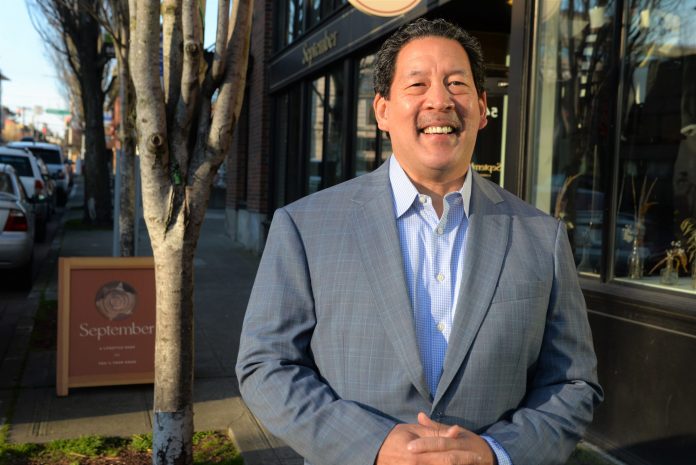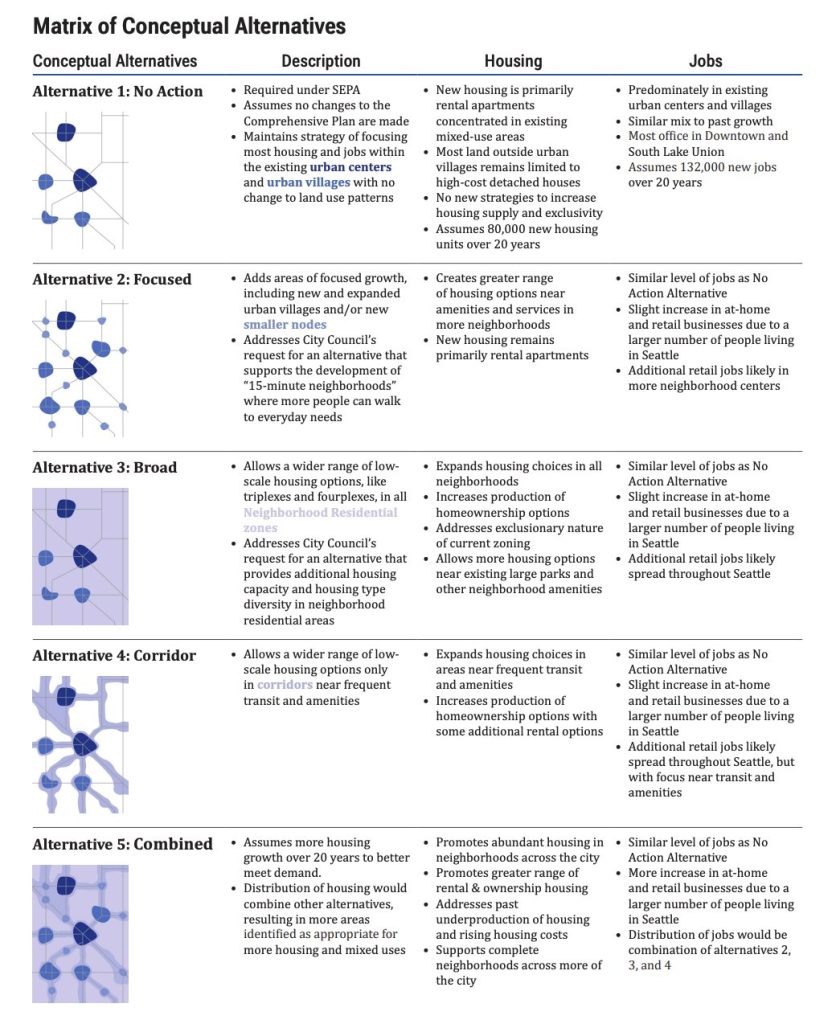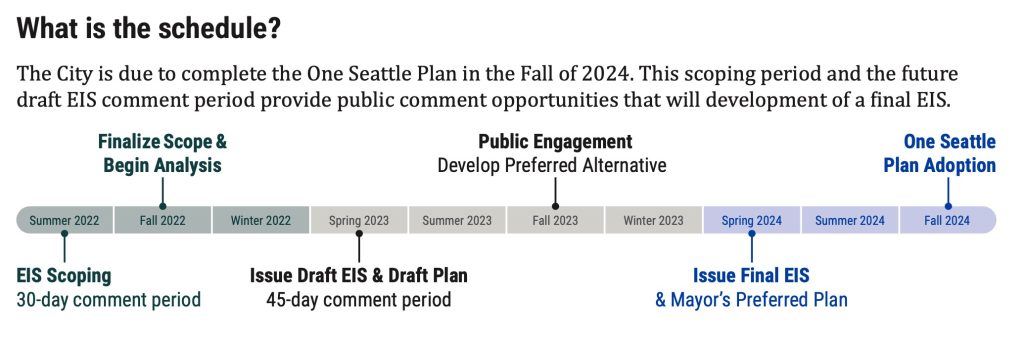
The draft plan still isn’t out, which is worrying housing advocates. But success is still within reach.
Last year, the City of Seattle had planned to release its draft “One Seattle” Comprehensive Plan in April, but that draft has still not been released to the public after the Harrell administration has repeatedly set new timelines for its release. This is leading to concerns that Seattle will miss its 2024 deadline to approve the plan, including from Seattle City Council’s newly installed land use committee chair, Tammy Morales. The December 31 deadline is baked into Washington’s Growth Management Act (GMA), which requires all jurisdictions in the state’s urban areas to update their comprehensive plans every ten years.
Morales said she was meeting with the Office of Planning and Community Development (OPCD) this week to get a briefing, but early indications are that she will face a challenge to guide the Environmental Impact Statement (EIS) process to completion and amend and approve the plan before the calendar turns to 2025.
“I am concerned,” Morales told The Urbanist last week. “It’s my understanding that they’re expecting to have a draft EIS in February, maybe mid-February, but I sort of expect at this point that we will have to request an extension. I’m going to see what we can do to try to stay on some sort of 2024 timeline, but it’s not looking likely from my understanding.”
How did the comprehensive plan fall behind schedule?
OPCD has yet to confirm a February release of the draft EIS, which will reveal what adjustments the Harrell administration has been tinkering with as the plan has slipped deeper behind schedule. The agency released its scoping report way back in November 2022. A gap of 15 months from scoping report to draft plan is odd, but officials point to new state requirements around “missing middle” housing as throwing off their plan and timeline — despite the fact that the legislation had been in the works for some time.
“With the passage of HB 1110 in May of last year, we needed to revisit several aspects of the plan to make sure we can successfully implement its provisions. This has taken more time than anticipated and required revision of initial timelines set by OPCD,” Seferiana Day, OPCD’s communication manager, said in an email. “A 10-year update to the City’s Comprehensive Plan is a major undertaking, especially given the scale of changes under consideration as we seek to increase housing capacity across Seattle.”
Just this week, OPCD released an overview of its approach to House Bill 1110, but the document, which is just over one page long, doesn’t provide a lot of insight for anyone who had been following the bill over the past year. It does provide information about a forthcoming “Neighborhood Residential Design Concepts” study that will outline how changes to the city’s lowest density zones are proposed to happen.
Two options from the scoping report — broad alternative 3 and combined alternative 5 — would appear to offer compliance with the new middle housing requirements by replacing single family zoning with multiplex zoning. The City could take a mix-and-match from the studied alternatives approach to selecting a final plan, anyway.

The comprehensive plan update lays out a 20-year growth strategy and presents an opportunity to overhaul the city’s overarching approach to housing and infrastructure; it ultimately defines Seattle’s land use and zoning map. A transportation element, to be developed from the Seattle Department of Transportation’s Seattle Transportation Plan, outlines how changes to the mobility system are envisioned as the city grows, but entities like the Seattle Planning Commission have noted a lack of coordination between the land use and transportation elements.
OPCD’s initial reaction to the state requirements (passed in April) had been delaying the release until June, and then September, and then the City stopped giving exact timelines for the One Seattle plan altogether. Meanwhile, the transportation element plan was released in August and the accompanying draft EIS shortly thereafter. The comment period has already came and went.
Shifting alliances on city council
Following the retirement of four sitting councilmembers, Andrew Lewis losing reelection, and Teresa Mosqueda winning higher office, housing advocates will need to win over a Seattle City Council with six new members. As issues of crime and homelessness dominated the election, candidates with clearly stronger platforms around housing abundance and zoning reform lost in several races — mostly notably Ron Davis, Alex Hudson, Maren Costa, and Lewis, who lost to anti-housing activist Bob Kettle in District 7.

Davis, Hudson, Costa, and ChrisTiana ObeySumner all voiced support for adding grassroots-backed Alternative 6, which would have expanded housing options even further, to the study. All lost their races — in Davis’s case by just 235 votes. Harrell rejected the push to add Alternative 6 to the study despite that option scoring well in public outreach and garnering support from Mosqueda and Morales.
While the centrist shift on council has led to worries that the city’s new leadership will take a more conservative approach to housing and zoning reform, complying with the state’s new middle housing requirements will provide a guardrail. A state loophole allows the City to preserve single-family zoning on one quarter of the land currently zoned as such if it goes through the work of applying for an exception and demonstrating an anti-displacement purpose for the move. The City has not tipped its hand, but it seems likely Harrell will explore such an option, with Harrell ally Dan Strauss noting an openness to the idea in debates. That would also provide an explanation for why the plan has taken so long to revise and release.
Harrell spokesperson Jamie Housen deferred to OPCD staff on timelines and process, but did pledge the plan would promote affordability, equity, and climate resiliency.
“Mayor Harrell is committed to expanding housing capacity and opportunity across the city as we promote an affordable and equitable Seattle, create vibrant and walkable neighborhoods, and ensure a climate-resilient future,” Housen said.
Day of OPCD argued getting the plan right was more important than timelines, and noted the inclusion of five alternatives in the EIS (rather than a more modest variety) has also contributed to the delay.
“We feel it’s more important to get this right and adjust release dates as necessary since changes represented in this plan to accommodate more growth will have far-reaching impacts,” Day said.
Still enough time to get it right and meet the deadline
However, sustainable land use advocacy nonprofit Futurewise did not agree with that assessment. Futurewise was founded to implement the Growth Management Act in Washington State and regularly sues cities who fail to adequately comply.
“The 2024 periodic update is very important; it needs to be done well and on time,” Futurewise Director of Research Tiernan Martin said. “With this update, cities and counties will bring their comprehensive plans into compliance with several major changes to the Growth Management Act, including new requirements in the Housing element aimed at addressing housing supply and affordability issues. Many other Puget Sound cities we work with have made good progress in their updates and are poised to complete the process before the December 31, 2024 deadline.”

Futurewise is a lead member of a broad alliance of stakeholders called the Complete Communities Coalition (of which The Urbanist is also a member) that runs the gambit from housing advocates, builders, unions, nonprofits, and business. With Mosqueda’s departure to take her seat on King County Council, that coalition has called on the Seattle City Council to appoint a temporary fill-in councilmember with the experience and vision to shoulder the load when it comes to advancing the comprehensive plan update. While the fill-in would only serve until the November election results are certified, they will have a chance to influence the plan considerably given their post on the land use committee.

So far, small business owner Tanya Woo, who ran against Morales and lost, is the leading contender, with strong support from the incoming crop of centrist councilmembers and the big business interests that funded their campaigns. Woo has very little experience with comprehensive planning and has championed local control and seeking an exemption from the state to preserve some single family zoning.
“I think we need to bring [zoning] back down to the neighborhood level because every single neighborhood is different and the neighborhood plans have not been updated since 2000,” Woo said at a candidate forum hosted by the Complete Communities Coalition in September.
Having little consensus and some councilmembers still getting up to speed could ultimately doom hopes of passing the comprehensive plan in 2024 and getting to underlying goal of expanding housing options as soon as possible.
What happens if the plan is late?
Despite the shortened schedule and looming deadlines, OPCD pledged a robust outreach process.
“We look forward to releasing our draft One Seattle Plan and engaging the public in a robust dialogue this coming year. As we did earlier during the scoping period, we intend to conduct broad, inclusive, and equitable public engagement for this next phase. This critical part of the process will be thorough, so that a variety of perspectives have an opportunity to participate.”
What exactly the state’s reaction will be if Seattle blows past its comprehensive plan deadline is an open question. The state could look the other way or it could opt to make an example of Seattle for not more diligently working to meet the deadline. The state would be within its rights to freeze state grants to the city until the plan is complete — plus public shaming could sting and hurt Seattle-sponsored legislation in Olympia. State can choose to grant extensions for the HB 1110 missing middle deadline, but the comp plain deadline itself.
“I think the fact that we are, according to your website, in maybe [the year of] ‘Housing 2.0’ in the legislature, it’s possible that folks will be a little more scrutinizing and a little more into why these delays have happened, but I just don’t have an answer to that,” Morales said.
Passage of statewide missing middle requirements also adds another deadline six months after comprehensive plan updates were to be due. If Seattle (or other cities) do not meet that deadline, the state’s model code for missing middle housing — still in formation and arguably with some kinks to be worked out — will supersede single family zoning. Whether city leadership likes it or not, exclusive single family zoning would be history — at least temporarily until they pass a comprehensive plan update that successfully seeks an exemption.
But such a scenario would not necessarily be a homebuilding bonanza. Having to potentially comply with three different sets of regulations in the space of a year could end up being the type of chaos that hinders homebuilding rather than encouraging it. If Seattle fails to update its comprehensive plan in time, the City could be subject to state sanctions, including potentially becoming ineligible for state and federal grants. Repercussions for not complying with the GMA could become even more stringent under a new “builders’ remedy” bill being considered by the legislature this session, House Bill 2113, proposed by Rep. Jessica Bateman (D-22, Olympia).
Simply complying with the state deadline would be much simpler, provide more certainty for homebuilders, and allow the City to go beyond the model code. Futurewise offered OPCD its assistance and argued meeting the deadline was still well within the City’s power with some determination and collaboration.
“Seattle, which has not yet released its draft plan and EIS, has experienced planning staff, state-funded planning grants, and a mayor and council committed to working together effectively,” Martin said. “With these resources and advantages, the City has everything it needs to complete the process on time, and Futurewise is here to support the City in every way we can in this endeavor.” Seattleites can also offer their support and urge the city to act decisively to make housing abundance a reality as soon as possible.
The Mayor’s Office can be reached at (206) 684-4000 or via this contact form.
Clarification: This article has updated on January 19 to clarify that the state only grants extensions for HB 1110 compliance not for comprehensive plan deadlines.
Doug Trumm is publisher of The Urbanist. An Urbanist writer since 2015, he dreams of pedestrian streets, bus lanes, and a mass-timber building spree to end our housing crisis. He graduated from the Evans School of Public Policy and Governance at the University of Washington in 2019. He lives in Seattle's Fremont neighborhood and loves to explore the city by foot and by bike.



